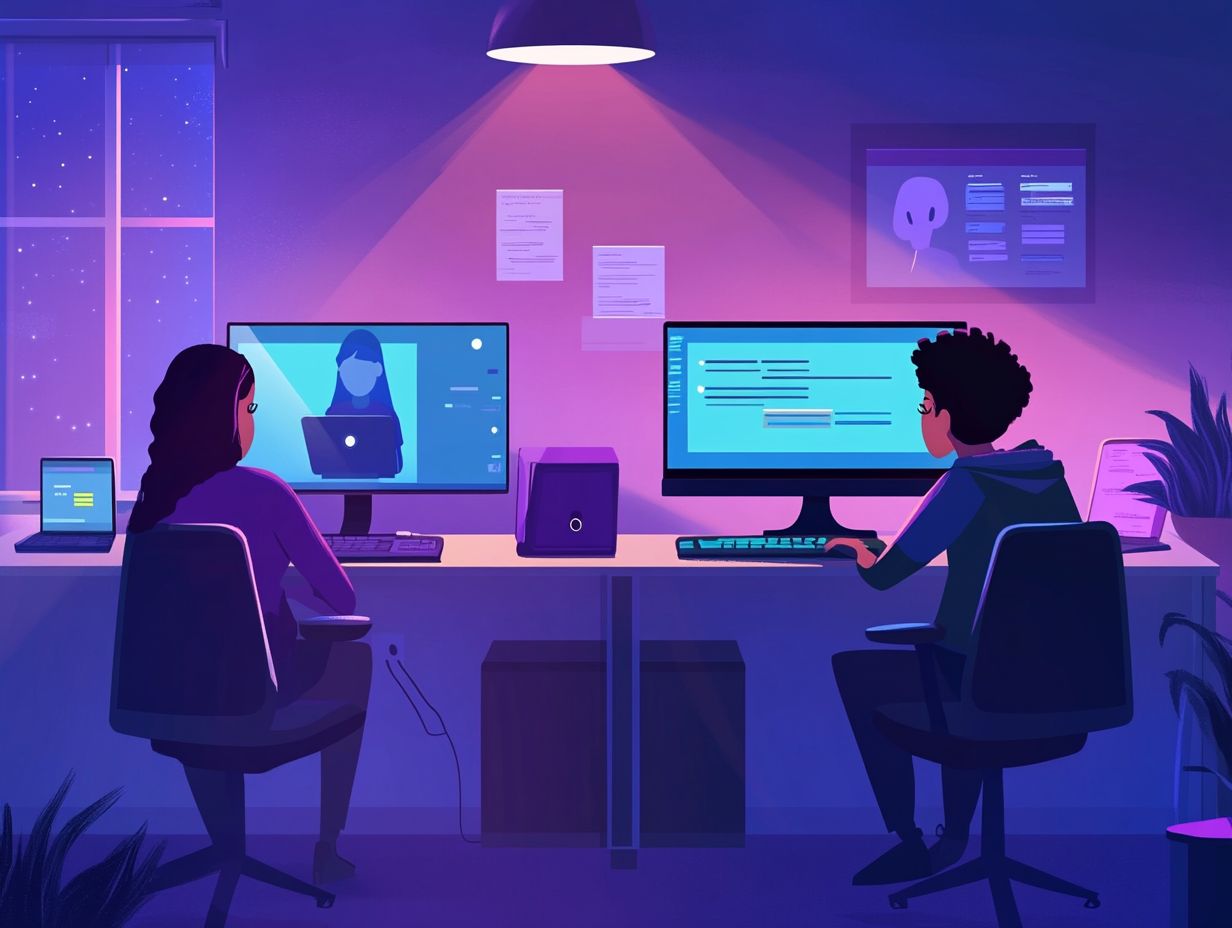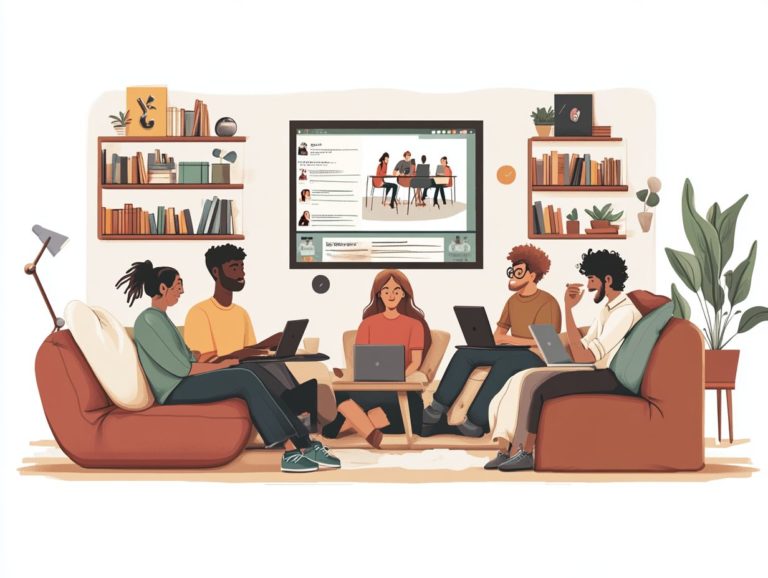5 Things to Know About Online Class Etiquette
Navigating online classes presents an exhilarating yet challenging journey. As more students embrace this digital learning landscape, grasping the nuances of proper etiquette becomes imperative.
This article outlines five fundamental principles that cultivate respect and engagement, ensuring a rewarding experience for all participants. By maintaining professionalism and actively participating, you can significantly enhance your learning experience while forging stronger connections with professors and classmates alike.
Are you ready to dive into these exciting insights? Let s embark on this journey together!
Contents
- Key Takeaways:
- 1. Be Respectful to Your Professor and Classmates
- 2. Follow Proper Internet Etiquette
- 3. Avoid Distractions and Be Present
- 4. Participate Actively in Class Discussions
- 5. Be Mindful of Your Background and Appearance
- Why Is Online Class Etiquette Important?
- What Are the Consequences of Not Following Proper Online Class Etiquette?
- How Can One Maintain Professionalism in an Online Class?
- What Are the Common Mistakes to Avoid in Online Classes?
- How Can One Build a Good Relationship with Their Professor in an Online Class?
- What Are Some Tips for Success in Online Classes?
- Frequently Asked Questions
- What is online class etiquette?
- Why is online class etiquette important?
- What are the 5 things to know about online class etiquette?
- How can I be punctual and prepared for online classes?
- What should I do to respect others’ time and attention during online classes?
- How can I participate actively and listen attentively in online classes?
Key Takeaways:

- Show respect to your professor and classmates by being on time, attentive, and courteous in online classes.
- Follow proper internet etiquette, such as using appropriate language, avoiding all caps, and being mindful of your tone in online discussions.
- Eliminate distractions, be present, and actively participate in class discussions to make the most out of your online learning experience.
1. Be Respectful to Your Professor and Classmates
In an online learning environment, your respect for professors and classmates is essential for creating a collaborative and supportive atmosphere. This respect is shown through effective communication, active listening, and acknowledging the diverse opinions and contributions of your peers.
By doing so, you help cultivate a healthy virtual classroom dynamic. Whether engaging in academic discussions or collaborating on group projects, your respectful behavior reflects your character and reinforces the principles of academic integrity and accountability within the learning community.
To keep this atmosphere respectful, it s crucial to use proper grammar and spelling in all written communications. This attention to detail demonstrates professionalism and care for the subject matter. Staying on topic during discussions respects others time and leads to more productive conversations.
Timely responses to emails show your commitment and reliability. During online meetings, listen actively, allowing each speaker to finish their points before contributing. For instance, summarizing a peer s argument before sharing your perspective can validate their input and strengthen the dialogue.
Ensuring clarity in your communication helps keep everyone on the same page, reducing misunderstandings and promoting a more inclusive environment.
2. Follow Proper Internet Etiquette
Following proper internet etiquette is crucial for maintaining a positive and effective online learning environment. It sets the tone for respectful interactions and productive academic discussions.
Key elements include being on time, which reflects your commitment to the learning process and allows everyone to benefit from shared insights. When you mute yourself during discussions unless you re speaking, it helps minimize background distractions that could disrupt the flow of dialogue.
Being mindful of your surroundings and controlling background noise can significantly enhance communication, ensuring that all participants can focus and engage meaningfully.
By adhering to these internet etiquette principles, you contribute to a supportive atmosphere where learning flourishes without interruptions, maximizing the overall educational experience for everyone involved.
3. Avoid Distractions and Be Present
To truly maximize your learning outcomes in a virtual classroom, it s essential to actively sidestep distractions and maintain your focused attention during online sessions and discussions.
By creating a distraction-free environment addressing background noise and other interruptions you can engage fully with your professors and peers, ultimately leading to richer learning experiences.
Choosing a quiet space away from household noise is crucial, as is using technology to minimize potential distractions. Establishing a dedicated study area not only enhances your concentration but also sends a clear message to those around you that this time is reserved for learning.
Using productivity apps can help you stay on top of assignments and deadlines, reinforcing your academic responsibilities.
When you direct your full attention to discussions, you significantly boost your ability to participate meaningfully, fostering a collaborative atmosphere that benefits everyone involved.
In conclusion, by applying these principles of respect, internet etiquette, and focus, you can create a positive and productive online learning environment. Embrace these strategies to enhance your educational journey and build lasting connections in the digital classroom.
4. Participate Actively in Class Discussions

Active participation in class discussions is a cornerstone of your online learning journey. It allows you to engage deeply with the material and enhances your understanding through collaborative discourse.
By contributing thoughtfully and respectfully, you reinforce your own knowledge and help create a dynamic classroom environment that values diverse perspectives and critical engagement.
Encouraging everyone to share clear and concise points during conversations enriches your learning experience. This enables you to build upon one another s ideas.
Asking questions is vital, as it opens the floor for exploration and clears up any misunderstandings. By respecting the opinions of your peers, you foster an atmosphere of trust and support, making everyone more willing to express their thoughts.
Staying focused on the topic ensures that discussions remain productive and on track. Utilizing collaborative tools allows your group to streamline interactions, leading to meaningful conversations that enhance both individual and collective learning outcomes.
5. Be Mindful of Your Background and Appearance
In a virtual classroom setting, be mindful of your background and appearance during video conferencing. This is essential for creating a professional environment that embodies the principles of online learning.
Choosing the right attire and ensuring a distraction-free background enhances your online participation. It also shows respect for the educational process and your fellow classmates. Dressing appropriately signals your commitment to professionalism and fosters an environment that encourages focused discussion and engagement.
Select clothing that aligns with the formality of the setting. This choice can influence others perceptions and promote a serious dedication to the coursework.
An organized background think neutral colors or minimalistic decor minimizes distractions. This allows you and your peers to concentrate fully on the content at hand.
Ultimately, these strategies improve your presence and contribute significantly to the overall effectiveness of communication within the group.
Why Is Online Class Etiquette Important?
Online class etiquette is essential for your success, as it directly influences the effectiveness of your learning environment. Discovering ways to enhance your online learning experience can shape your interactions and the overall success of academic discussions and collaborative efforts.
When you and your peers adhere to established etiquette guidelines, you contribute to a respectful atmosphere that fosters engagement, accountability, and positive dynamics. This ultimately enhances your educational experience.
Cultivating respect helps everyone feel valued and encourages diverse ideas, which are essential for a rich learning experience.
This set of shared norms plays a crucial role in minimizing misunderstandings and conflicts, allowing for smoother communication.
A well-mannered approach in online classes leads to increased participation, where every voice is heard and appreciated.
When you commit to these guidelines, you nurture an inclusive environment that supports growth and collaboration, benefiting the entire academic community.
What Are the Consequences of Not Following Proper Online Class Etiquette?
Neglecting proper online class etiquette can have serious repercussions, ranging from misunderstandings to communication breakdowns. This ultimately diminishes the learning experience for both students and professors.
These consequences manifest as reduced participation, a lack of accountability, and a less productive classroom environment. All of these can undermine academic integrity, meaning being honest and trustworthy in your studies, and collaborative opportunities.
When you engage in disrespectful interactions like interrupting others or using inappropriate language the atmosphere can quickly become tense and confusing. This lack of respect stifles open dialogue, making it less likely for students to express their thoughts or concerns.
As a result, key insights and questions might go unanswered, leading to a superficial understanding of the subject matter. Ineffective communication can create barriers between students and instructors, impairing their ability to collaborate effectively.
By cultivating a respectful dynamic, you can elevate your learning experience and foster a more supportive environment that encourages growth and understanding.
How Can One Maintain Professionalism in an Online Class?

Being professional in online classes builds your credibility. Here are a few tips for effective online learning in master’s programs that you can adopt.
Start by dressing in appropriate attire. Communicate respectfully and leverage technology to enhance your participation and uphold academic integrity.
For instance, arriving on time to virtual lectures shows your commitment. It respects both the instructor’s and your classmates time, helping to cultivate a culture of accountability.
Wearing suitable clothing sets a professional tone and aids in transitioning into a focused mindset. Studies suggest that dressing well can influence productivity positively.
By adhering to established communication protocols, such as using professional language and responding promptly to emails, you foster mutual respect among your peers. This creates a supportive atmosphere where everyone feels valued and engaged.
What Are the Common Mistakes to Avoid in Online Classes?
Common mistakes in online classes can derail your learning. Being aware of and avoiding these pitfalls is essential.
Typical errors include failing to respond in a timely manner and allowing distractions to creep in. Each of these can seriously hinder effective communication and your academic progress.
These missteps can manifest as missing assignment deadlines or not participating in discussion forums, which are crucial for collaborative learning.
To counteract these issues, set clear schedules and reminders to keep track of your tasks. This fosters a sense of responsibility.
Creating a dedicated study space helps minimize distractions and keeps you focused. Engaging respectfully with your peers and instructors is equally important.
By actively participating in discussions and providing constructive feedback, you can enhance your online experience and contribute to building a supportive learning community.
How Can One Build a Good Relationship with Their Professor in an Online Class?
A good relationship with your professor enhances your learning experience. Intentional communication and respectful behavior are key.
By actively participating in discussions, submitting assignments on time, and reaching out for clarification, you demonstrate commitment and engagement.
Regular email communication allows you to ask questions and share thoughts, fostering a connection. Attending virtual office hours provides a unique opportunity for one-on-one interaction.
This interaction enables you to express your interests and engage in meaningful dialogue. Expressing gratitude for feedback encourages your professors and cultivates a positive atmosphere where you feel valued.
These steps create a supportive learning environment and enrich your academic journey.
What Are Some Tips for Success in Online Classes?
To succeed in online classes, use these key strategies to maximize your learning potential and fulfill your academic responsibilities.
Hone strong organizational skills and manage your time wisely. Actively participating in discussions and activities can significantly elevate your online learning experience.
Consider crafting a structured weekly schedule that dedicates specific study periods to each subject. This ensures that none slip through the cracks.
Leverage online resources like educational videos and virtual libraries for additional support. These invaluable tools reinforce your course material.
Using collaborative tools such as shared documents encourages teamwork and enriches group projects. You and your peers can brainstorm and exchange ideas effortlessly.
Ultimately, maintaining active engagement helps you grasp concepts more effectively. Embracing accountability ensures you remain steadfast on your academic journey.
Frequently Asked Questions

What is online class etiquette?
Online class etiquette consists of rules and guidelines for participating in virtual classes. It covers behavior, communication, and manners to create a respectful learning environment.
Why is online class etiquette important?
This etiquette is essential for a positive learning experience. Staying professional and respectful enhances engagement in the virtual classroom.
What are the 5 things to know about online class etiquette?
Here are five key points:
- Be on time and ready for class.
- Respect others time and attention.
- Participate and listen actively.
- Use suitable language and tone.
- Follow guidelines for using technology.
How can I be punctual and prepared for online classes?
To be punctual and ready:
- Log in on time.
- Check your materials and devices beforehand.
- Minimize distractions around you.
- Have a positive mindset and a willingness to learn.
What should I do to respect others’ time and attention during online classes?
Respect others by:
- Avoiding multitasking during class.
- Muting your microphone when not speaking.
- Listening actively and not interrupting.
- Using body language to show engagement.
How can I participate actively and listen attentively in online classes?
To engage fully, try to:
- Speak clearly and confidently.
- Ask questions and join discussions.
- Take notes and summarize key points.
- Use non-verbal cues to show you re listening.






